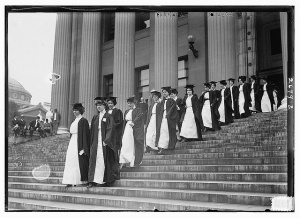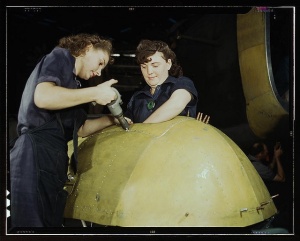Rosie the Riveter Meets Harriet Vane: Reflections on the Class of 2013 and Dorothy L. Sayers
The class of 2013 have been commenced. Oprah and Agent Seeley Booth shared their advice, Grandma and Granddad have taken their photos, celebratory vacations have been celebrated, and now the festivities are winding down. With this winding down, the question of work becomes the most relevant question in many ’13-er lives. The existential question of college – who am I? – has been translated into the question of work – what do I do? In late June, the class of 2013 divides into three broad categories: those who work, those who search for work (a full-time job in and of itself), and those who will continue to postgraduate study (and thus avoid work for as long as possible.)
That question – what do I do? – is a familiar one. It cast a futuristic shadow over the past twenty or twenty-two years, beginning with kindergarten Career Days, throughout the selection of our majors in college and into navel-examining sessions with career counselors in the last semester. The question of work was not just a question of passion but a question of self-selected status; when we youthful undergrads chose a career, we were choosing the public goalposts of our lives, and with the goalposts we chose the sport. Doctors? We were choosing long hours, good pay, and saving lives. Teachers? Long hours, bad pay, saving minds. Consultants? Long hours, excellent pay, saving businesses. Depending on the kind of college we attended, some careers were accompanied by apologies (investment banking, housewifery, or publishing) and others with ill-disguised bragging (investment banking, housewifery, or publishing).
One of my favorite quotes in high school came to me out of context. It was a line from Dorothy L. Sayers, that “The only Christian work is good work, well done.” Later on in college, I discovered a trove of Sayersian essays on the nature of work.
Sayers admitted that some may think she had an “obsession” with the subject of work (“Why Work”) but defended her interest by arguing, “It seems to me that what becomes of civilization after this war is going to depend enormously on our being able to effect this revolution in our ideas about work. Unless we do change our way of thought about work, I do not think we shall ever escape form the appalling squirrel cage of economic confusion in which we have been madly turning for the last three centuries or so… A society in which consumption ahs to be artificially stimulated in order to keep production going is a society founded on trash and waste, and such a society is a house built upon sand” (ibid).
A society founded on artificially stimulated consumption? A people confused and conflicted about the purpose and place of work? Individuals trying to navigate the whirlpools of identity – who am I? What do I do? – in search of greater meaning? These are not only relevant topics; they are urgent, perhaps even more urgent today than in Sayers’ own time.
In the colleges of the twenty-first century, our posture towards careers is often that of Rosie the Riveter: empowering women (and men) for the necessary work, telling them You can do it! Implicit in our encouragement is the inextricable connection between what we do and how it makes us feel: strong, important, significant. With women, in particular, we charge them to go further, aim higher, and celebrate the fact that you – a woman! – have accomplished what you have.
Sayers has none of this. Throughout her ouerve, in essays collected in Letters to a Diminished Church and throughout her Lord Peter Wimsey mysteries, particularly Gaudy Night, she calls us again and again to focus on the work, not the worker. Harriet Vane strives to write murder mysteries even after being charged with murder because that is her work; when her own fear of matrimony begins to hinder her writing, it is Harriet who must change in order to write the best book she can. Sayers agrees that we are defined by our work, but it is in how well we serve the work, not how well the work serves to give us our sense of identity. The questions we ask in college – Who am I? What do I do? – are, to no small degree, the wrong questions. Instead, we should ask: What is my work? and How well will I do it?
Rather than acceding to gender-bounded norms, Sayers sweeps them aside. Rather than telling women to stay at home or crack the glass ceiling, Sayers asks women and men to discern their individual (individual!) role. Rather than focus on status or profit, she focuses on the task at hand and charges us with taking the same focus as well.
By understanding work in this context, Sayers moves us away from ourselves and our preconceived ideas about what kind of work is worthwhile, who should do it, and why. Her thoughts on work are not valuable because they are progressive or conservative (they are not either, not completely), but because they are grounded in a holistic understanding of the importance of work in the human experience, and of the fraught relationships between humans themselves. That holistic understanding is rare today, and one that graduates — and others — still seek. – GCL
If you like this, try “Having It All Over Again: Deconstruction and Reconstruction of the Esquire Argument.”
Read more Dorothy L. Sayers: Are Women Human? Penetrating, Sensible and Witty Essays on Human Nature ; The Mind of the Maker; Letters to a Diminished Church; The Lost Tools of Learning.



